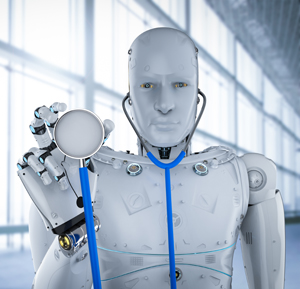
Your complimentary articles
You’ve read one of your four complimentary articles for this month.
You can read four articles free per month. To have complete access to the thousands of philosophy articles on this site, please
News
News: August/September 2021
Templeton supports Church, shock news • Big Data is Watching Over You • Judith Jarvis Thomson — News reports by Anja Steinbauer
Ethics of AI in Health

The doctor will see you now.
Photo © istock.com/PhonlamaiPhoto
Artificial Intelligence, particularly machine learning combined with Big Data, shows vast promise in helping to diagnose medical conditions and recommend the best treatment options. But what about privacy; what about the safety of individual patients? What of overview by doctors with decades of training and experience? Two years of work by twenty experts has now resulted in a guidance report published by the World Health Organization outlining six key principles for the ethical use of AI in healthcare settings. While the document comments favourably on the potential of AI in treating patients especially in under-resourced areas, it warns that AI should not be used as an easy substitute for traditional treatment methods, and that authorities should consider carefully where it’s use is appropriate. The WHO document is intended as a foundation on which governments, developers and regulators can build their practices. The six principles it proposes are: protecting autonomy; promoting human safety and well-being; ensuring transparency; fostering accountability; ensuring equity; and promoting tools that are responsive and sustainable.
X-Phi of Religion
Not much external funding is available for philosophical projects, as most university-based philosophers know only too well. However, Ian Church, assistant professor for philosophy at Hillsdale College in Michigan seems to have lucked in. The Templeton Foundation, whose vision includes “infinite scientific and spiritual progress,” has offered Church a grant of just under $2.5 million to fund a three-year project titled ‘Launching Experimental Philosophy of Religion’. Church comments: “It’s an extremely exciting time to be doing philosophy, especially from a Christian perspective.” He explains that he and his experimental philosophy (‘x-phi’) colleagues are aiming to explore how relevant contexts, such as the news, inform our moral judgements: “Why is it that the world might seem to contain so much pointless suffering? Think about how we learn about the world very commonly: via the news. Frequently, the news is reporting on tragic events and then cutting to a commercial break where you learn about a new fabric softener. You’re just jumping around and learning about terrible suffering and moving on. There’s no broader context. That might suggest that this way of reporting on the world might make it seem more dangerous, evil, and pointless than it actually is.”
Forensic Database Controversy
The Y-chromosome Haplotype Reference Database (yhrd.org) has had an online presence since 2000. It is a very useful tool, and has in many ways been a great force for good. It is widely used across the world to help solve sex crimes and settle paternity issues. Scientists from universities as well as crime laboratories have uploaded data to it, so that it now contains more than 300,000 anonymous Y-chromosome profiles, demonstrating how particular genetic markers are indicators of male lineages in more than 1,300 distinct global populations. However, ethics concern have arisen as it also holds data from individuals who may not have given their consent, such as the Uyghurs in China and the Roma in Eastern Europe, as well as other ethnic minorities. Computational biologist Yves Moreau (Catholic University of Leuven) focuses his public criticism on China: “China is pursuing, and trying to export, an authoritarian political model based on surveillance technology, including genetic surveillance of minorities. Researchers, database curators and science publishers should not be complicit in this model – absolutely in no way.” Science historian Veronika Lipphardt, sociologist Mihai Surdu, both at the University of Freiburg, and geneticist Gudrun Rappold at the University of Heidelberg have recently published their research on genetic studies about the Roma. “It is extremely doubtful that such studies were always done with people’s fully informed consent,” concludes Lipphardt. Representatives of the European Society of Human Genetics published an opinion piece in January 2021, stating: “We would like to see an end to collaborations between academic and clinical institutions worldwide and institutions in countries carrying out widespread, unethical DNA collections and/or analysis.” On the other hand Walther Parson, curator of another forensic database (EMPOP), warns: “Judges anywhere in the world rely on robust forensic data. Excluding data from minority groups could bias statistical evaluations in forensic reports – to their disadvantage.”
Judith Jarvis Thomson
The ground-breaking American ethicist Judith Jarvis Thomson died recently, aged 91. For most of her life Thomson taught philosophy at MIT. She was involved in developing and extending the famous ‘Trolley Problem’ discovered by Philippa Foot in 1967. (Should you shift the points so that a runaway trolley kills one track worker on a siding rather than five guys working on the main line?) However, Thomson’s best-known piece of work is an essay she wrote in 1971, ‘A Defense of Abortion’. In it she invented an unusual and famous thought experiment. As the Stanford Encyclopedia of Philosophy puts it: “imagine that while we sleep a group of music lovers stealthily attach to us a famous violinist who is suffering from an ailment, and we uniquely can keep him alive for roughly nine months, as he convalesces. The question is: may we detach the violinist, causing his death? Thomson argues that we may, since our negative rights have been violated and no one has the right to use another’s body, even to save his own life. Of course, the analogy here is limited to cases of non-consensual impregnation, such as those resulting from rape.” Thomson’s violinist story is said to have shifted the focus of abortion debates somewhat from the question of personhood of the foetus towards the rights of the mother. It also (like the Trolley Problem) concerns the ethical distinction between killing and letting die.









